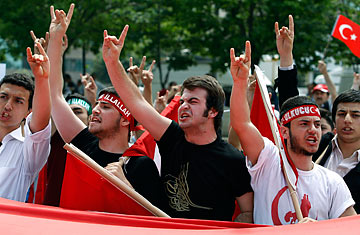
Demonstrators protest against Israel near the Israeli Consulate in Istanbul, Turkey, on June 1, 2010
For the second day in a row, hundreds of protesters chanted, "Down with Israel," outside the Israeli diplomatic missions in Ankara and Istanbul. In Istanbul, the commercial capital, women in headscarves and in tank tops from across the country's political spectrum waved Palestinian and Turkish flags alongside teenagers wearing green Islamic bands scrawled with Koranic and anti-Israel slogans. Civil society groups blew horns as they urged people of all ideological stripes to come together. "This is an attack against humanity," says Pinar Aksayan, 25, a member of the ruling AK Party's youth wing. "It doesn't matter if it happens in Israel, Turkey or Virginia. This was morally wrong, and there must be justice." Turkey used to be Israel's strongest friend among Muslim nations. But the deaths of several Turks on a merchant ship with Turkey's flag that was attempting to break through a naval blockade of Gaza appear to signal the tipping point of a relationship on the outs.
In the central city of Konya, protesters reportedly burned Israeli flags and floated a mock-up of the ship painted blood red. Authorities urged an immediate boycott of Israeli goods and a more aggressive condemnation from the European Union and the U.S. Similar protests took place in cities around the country at a scale not seen since Israel's deadly December 2008 military offensive into Gaza left hundreds dead.
Some of the harshest words came from the very top. In an emotional address on Tuesday to Turkish lawmakers, Prime Minister Recep Tayyip Erdogan called Israel's action a "bloody massacre" that showed "how good they are at killing people." He asserted that it would mark a "turning point" in bilateral relations. "Israel in no way can legitimize this murder. It cannot wash its hands of this blood," he said with tremors in his voice.
For decades, predominantly secular Turkey and the Jewish state have had strong trade and military ties, an exception in a fractious Mideast region. The relationship dates to the post–World War II era, when Turkey welcomed Jews fleeing Nazi persecution and was one of the first countries to recognize Israel. But there has been a cooling off since Erdogan's moderately Islamist AK administration took power in 2002.
The slide accelerated after Israel's war in Gaza two years ago. That conflict came on the heels of failed Turkish efforts to broker peace between Israel and Syria. Top Turkish officials have made no secret of their disdain for Israeli Prime Minister Benjamin Netanyahu's year-old hawkish government, reiterating their refusal to hold high-level meetings with them. Hugh Pope, a Turkey and Middle East analyst with the International Crisis Group, explains that in recent years, Turkey has "indexed" its relations with Israel based on Israel's treatment of Palestinians. Graphic media reports from the 2008-09 war and the ongoing blockade have stirred the Turkish public. "Now we're in new territory," he says. "This is the first time that Israelis have spilled Turkish blood, in a way that the whole world has condemned."
The government has already withdrawn its ambassador to Israel and canceled a planned series of joint military exercises while demanding that the U.N. Security Council hold an emergency session and launch an immediate investigation. Some ministers have publicly suggested even sharper measures. "Turkey Launches Long-Term Diplomatic War Against Israel," read a Tuesday headline in the Hurriyet Daily News, an English-language daily. Given the Prime Minister's remarks and reports of a second aid flotilla, tensions are likely to get worse. Student activists, for their part, insist protests will go on until concrete measures are taken to punish the Israeli authorities responsible for the death of their countrymen. But they hedge that despite all the heated rhetoric, they are not against ordinary Israelis. "Of course we have no problem with the Israeli people, but we expect that they will pressure their government," says Can Acun, a political science student. "They should protest like us too."
